Cybersecurity is the guardian in today’s digital era. With threats like ransomware, phishing, and DDoS attacks occurring regularly, the rapid changes in this ever-evolving field offer talented professionals with an ideal career opportunity, even if you don’t have a degree.
Skill Set Required for Cybersecurity
At its core, cybersecurity is about understanding, defending, and mitigating risks in digital environments. To do this effectively, specific skills are indispensable, and these skills can be acquired without a formal education. Good examples include:
- Computer Science Fundamentals: A grasp of basic computing principles lays the foundation for more advanced learning. This includes understanding how operating systems work, databases, networks, and the basics of programming.
- Networking: As most cyber threats target networks, understanding how different network configurations work, the protocols involved, and potential vulnerabilities is crucial.
- Programming: While not mandatory, knowing how to code can be beneficial, especially for tasks like script writing, penetration testing, or vulnerability assessments. Languages like Python, Java, or C++ are often used in cybersecurity contexts.
- Security Frameworks & Protocols: Familiarity with security guidelines like ISO 27001/27002 and protocols such as SSL/TLS helps clarify the benchmarks for secure systems.
- Risk Assessment: Evaluating potential threats, their impact, and their likelihood is critical to pre-emptive defense.
- Penetration Testing & Incident Response: These are hands-on skills where you simulate cyber-attacks on systems (ethical hacking) or respond to actual security breaches.
If you are looking to acquire these skills without getting a degree, you should explore self-paced online courses. For example, training like this Foundations of Cybersecurity Program gives you a broad spectrum of skills and enables you to build your theoretical knowledge and hands-on understanding.
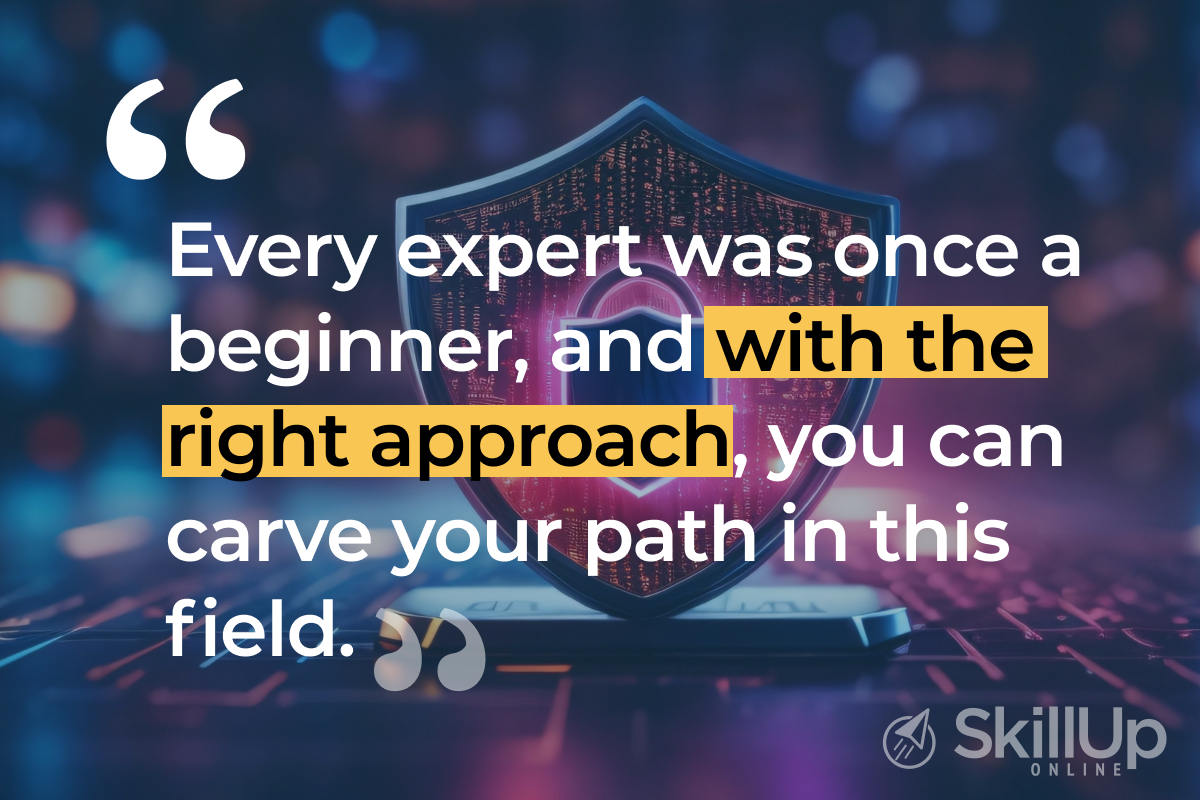
Why You Don’t Need a Degree for a Career in Cybersecurity
With new threats emerging daily and technology evolving at an unprecedented pace, adaptability and the ability to learn are paramount. This is where the traditional degree model sometimes falls short, for up-to-the-moment practical experience takes the upper hand. In fact, there are situational aspects where not having a degree in cybersecurity can work to your advantage.
- Dynamic Landscape of Threats: Cyber threats aren’t static. As technology advances, so do the methods and tactics of cybercriminals. Thus, real-world exposure can be more instructive than theoretical academic learning, where you continuously encounter and mitigate new threats.
- Hands-on Experience: Cybersecurity is a practice-oriented field. Handling live threats, setting up secure networks, or responding to real-time breaches gives insights that often can’t be replicated in a classroom setting.
- Certifications and Continuous Learning: The cybersecurity community values certifications because they reflect a professional’s current knowledge and skills. Certifications, often updated annually, stay abreast of the latest threats and best practices, making them invaluable.
- Employer’s Perspective: Many leading companies prioritise skills and relevant experience over formal degrees. They recognise that some of the best professionals in cybersecurity have honed their skills in the field, often self-taught or through specialised courses.
- The Value of Soft Skills: Cybersecurity isn’t just about technical acumen. Soft skills like critical thinking, problem-solving, and communication play a significant role. These skills, which can be developed outside formal education, are crucial when translating technical risks to business stakeholders or collaborating in diverse teams.
To illustrate, certifications like CompTIA Security+ or CISSP are not just stamps of approval, for they signify a person’s dedication to staying updated and their commitment to the field. Additionally, skilling yourself through courses on managing information security demonstrate the fact that you have focus.
Why Do Certifications Add Value to Your Resume?
Certifications help you establish yourself as a knowledgeable expert in your field. However, it is important to ensure that you obtain the type of certification that a prospective employer will value. And understanding the reasons why certifications add value to your resume, will help you choose the right certification to go for.
- Tangible Proof of Expertise: Certifications demonstrate valid and authentic proof of your expertise in a specific skill set; be it in managing information, incident response or preventing a cyber-attack.
- Industry Recognition: Certifications issued by industry recognized leaders such as IBM, Microsoft, AWS, Google and others are recognized, often required, by employers in the industry. Holding a respected certification signals to potential employers that you are equipped with the latest knowledge and can handle real-world challenges.
- Continuous Learning: Certifications often require periodic renewals, ensuring that professionals stay updated with the evolving threat landscape and the latest defense mechanisms.
A good way to kick-start your certification journey is to start with some foundational courses and then upskill to courses on security incident response that help demonstrate your ability to manage cybersecurity threats in real time.
In essence, while a degree might provide a foundation, certifications in the cybersecurity realm act as pillars of expertise, demonstrating your dedication, experience, and readiness to tackle the digital challenges of today and tomorrow.
Starting Your Journey Without Experience
Venturing into cybersecurity is daunting, especially with no formal degree or prior experience. But every expert was once a beginner and, with the right approach, you can carve your path in this field. Here’s how:
- Internships: Many organizations offer internships to individuals eager to learn. Although sometimes unpaid, these roles provide invaluable real-world experience, mentoring, and a foot in the door to the industry.
- Entry-Level Positions: Consider starting in IT support or helpdesk roles. These positions build foundational IT skills, offer exposure to corporate networks, and can serve as stepping stones to more specialized cybersecurity roles.
- Your Personal Cybersecurity Lab: Setting up a personal lab at home is an excellent hands-on experimentation method. Virtual machines can replicate network environments, test security tools, or even practice ethical hacking in a controlled setting.
- Online Courses and Tutorials: A wealth of information is available online. Platforms like SkillUp Online offer online skills courses like cybersecurity courses tailored for beginners. Courses such as Information Security Devices acquaint you with essential tools and practices.
- Volunteer Work: Many non-profit and community organizations need more resources for cybersecurity. Offering to assist can give you hands-on experience while also make a positive impact.
- Stay Updated: Cybersecurity is ever-evolving. Following industry news, joining online forums, or subscribing to cybersecurity magazines can keep you abreast of the latest developments.
By harnessing available resources, seeking opportunities, and consistently upgrading your skills, you can set the stage for a successful career in this dynamic field. And while you build the requisite experience, you can simultaneously build a positive network to support you.
The Art of Networking
Networking is more than just exchanging business cards; it’s about forging genuine relationships, sharing knowledge, and collaborating to combat cyber threats. For professionals navigating the world of cybersecurity without a formal degree, networking can be invaluable. Some ways to grow your network are:
- Industry Conferences: Black Hat, DEFCON, or local cybersecurity meetups are fantastic venues to meet peers, learn from experts, and discover emerging trends. Engaging in discussions, attending workshops, or even presenting can boost your visibility in the community.
- Mentorship Programs: Having a mentor can be transformational. They provide guidance, share their experiences, and introduce you to their professional network. And as you advance, you should also consider mentoring newcomers to pay it forward.
- Online Forums & Communities: Websites like Stack Exchange’s Information Security or Reddit’s r/cybersecurity are hubs for professionals to discuss challenges, seek advice, and share insights. Being active on such platforms can help you connect with a global community.
- Capture The Flag (CTF) Competitions: These are practical cybersecurity challenges that simulate real-world scenarios. Participating in CTFs sharpens your skills and allows you to collaborate with others, fostering teamwork and networking.
Each connection you make not only enhances your understanding and opens doors to opportunities but also contributes to the collective knowledge and strength of the cybersecurity community.
If you’re feeling hesitant about diving into the field without a formal degree, remember that the cybersecurity world values expertise, continuous learning, and practical know-how. With resources like SkillUp Online’s courses and a vibrant community waiting to collaborate, cybersecurity is more accessible than ever.
If you would like to know more about how you can build the necessary skills and get started in cybersecurity, contact our Learner Support Team at [email protected]. They will be more than happy to guide you on your next steps.
SkillUp Online
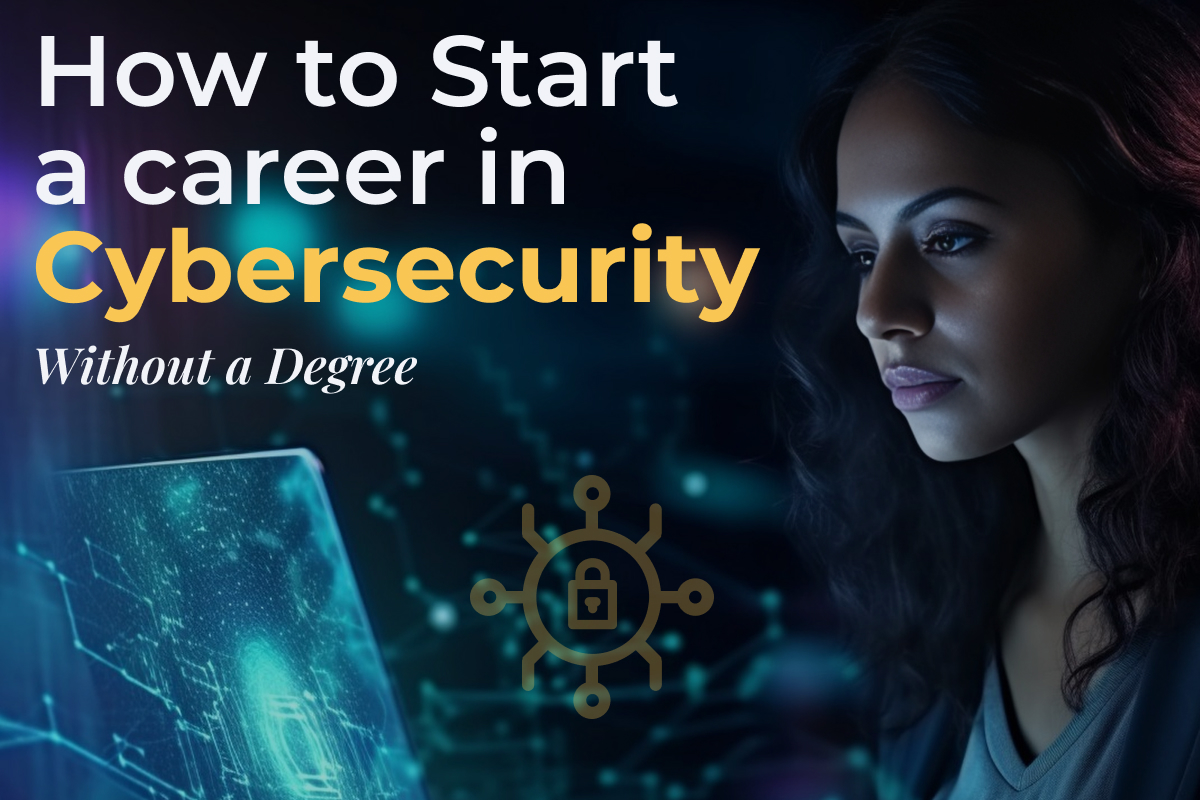
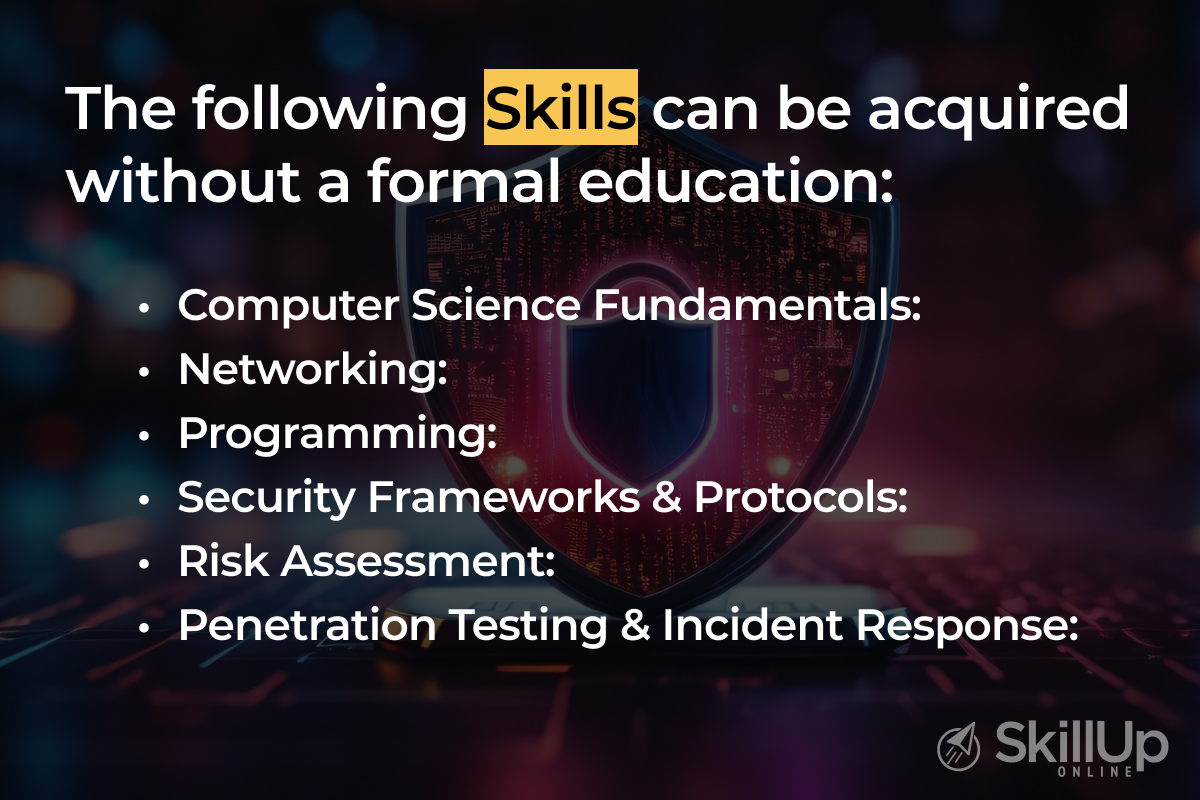
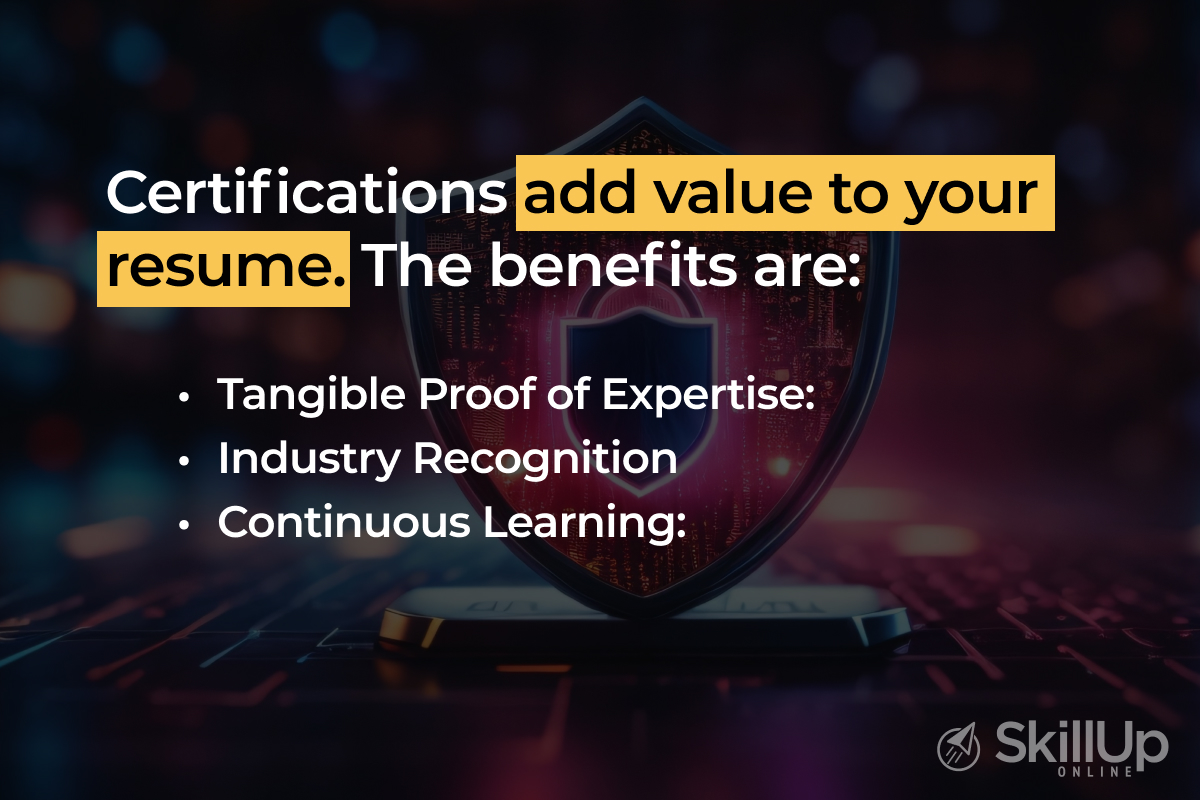

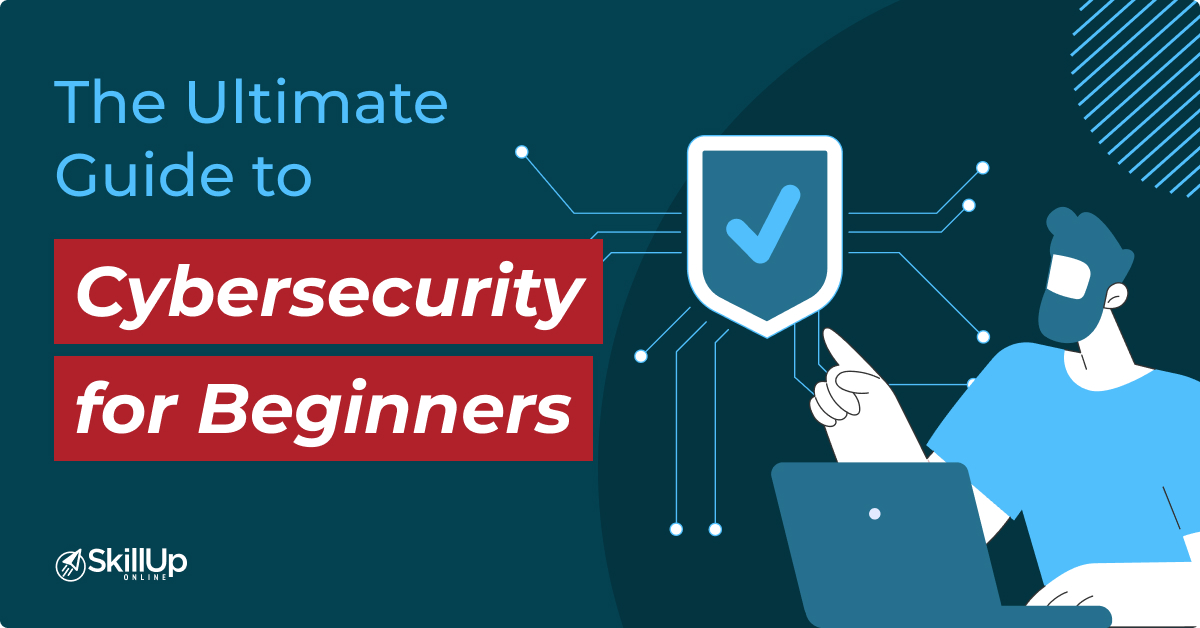



This is greate